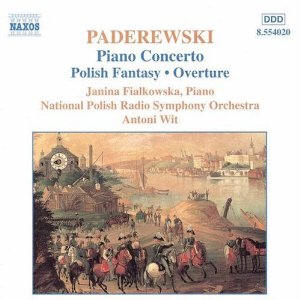|
You are reading the older HTML site
Positive Feedback ISSUE 56
Paderewski
Piano Concerto; Polish Fantasy; Overture Janina Fialkowska, piano (in Concerto, Fantasy); National Polish Radio Symphony/Antoni Wit. Naxos 8.554020. TT: 64:44. Ignace Jan Paderewski, like Chopin, is a nationalist icon of Polish music. Also like the earlier composer, he was a noted piano virtuoso, and wrote extensively for the instrument in both solo and concertante roles. In LP days, Paderewski's concerto seemed little more than a flashy display piece. An early-stereo Vox account from the estimable Felicja Blumental, with second-rate orchestral backing, left a pallid impression; Earl Wild's higher-profile RCA account with the London Symphony sounded like so much bravura bombast. The concerto has fared better in the digital era: a full-price coupling of the concerto and the Polish Fantasy on Koch International, featuring another Polish pianist, Ewa Kupieć, is especially impressive. This Naxos issue doesn't come off badly in the comparison. If Kupieć, on the Koch recording, delivers the concerto's solo part with big, resounding tone, Janina Fialkowska attacks it with energy and dash, and layers the textures even more sensitively. Her passagework, even in quick arpeggios, is always full-bodied, yet she has no trouble scaling back the sound. Note the calm poise she brings to the first movement's chorale subject after the preceding Sturm und Drang, and her sensitive layering of the Romanze's main theme. Similar parallels exist between the two orchestras and conductors. On Koch, Hugh Wolff draws high-octane playing from Frankfurt Radio forces. The Polish National Radio Symphony is not in the Frankfurt class, but other recordings have demonstrated these players' musical commitment, especially when, as here, Antoni Wit is conducting. In the concerto, the opening string unison is resonant and energetic, if a bit diffuse. Carefully shaped dynamics propel the broad, arching phrases across the barlines; rhythms are alert, and ensemble is mostly quite good. The brasses are proud and forthright in tutti. The woodwinds are ardent and sensitive; they favor a healthy mezzoforte in the outer movements, but the oboe solo near the end of the Romanza is nuanced and affecting. The Fantaisie polonaise sur des thèmes originaux, as it's rather grandly titled, takes in grand Romantic musical and pianistic gestures in the manner of Liszt's Hungarian Fantasy, which it often resembles. Unlike the Liszt piece, which "sounds Hungarian," Paderewski's doesn't sound particularly Polish. In fact, a habañera rhythm gives the opening theme an incongruously Spanish cast; Fialkowska, perhaps subconsciously, blunts the effect in her turn by double-dotting the rhythm! The structure of the piece sounds haphazard: it feels like it's about to wind up at 13:21, but spins out another seven minutes or so of engaging episodes. Fialkowska builds a solid, grand climax heading into the eighteen-minute mark, but the final few minutes sound like so much padding. Along the way, the pianist's agogics in the dancey theme at 7:04 sound self-conscious, but her dexterity dazzles in the following figurations; the orchestra's sinuous theme at 9:11 is fetching. As a welcome bonus, Naxos throws in the Overture, which, as far as I can tell, isn't available elsewhere. After a searching slow introduction, the main Allegro is lyrical and gracefully propelled, its lightly marked rhythms looking east to Russia's "Big Five." Paderewski here gives the woodwinds a more extensive role, both individually and as a choir, than in the concerted works, and the Polish Radio principals play with relish and point. The Overture, along with Naxos's budget price, decides the matter. In the two concerted works, the advantages of the Koch issue aren't commensurate with the price differential, given Fialkowska and Wit's persuasive musicality and commitment, and the excellence of the Naxos engineering.
|

